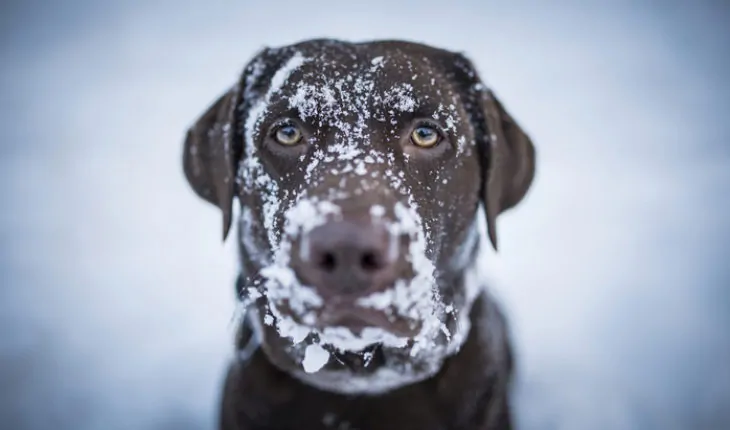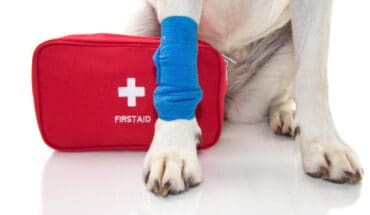Hypothermia is defined as the point at which the core body temperature falls below 37°C. Hypothermia will occur if your dog gets too cold and is most common if they have been in freezing water, even for a few minutes.
Keep your dog on a lead near frozen ponds. If they fall in NEVER be tempted to wade in or jump in after them. Always try and rescue them from the edge without going in yourself.
Sick, very old and very young dogs are less able to regulate their own body temperature and therefore more likely to get hypothermia. Furthermore these dogs may need a coat or sweater when taken out for walks in the winter.
Extreme hypothermia is very serious and can be fatal.
Signs and symptoms
Weak pulse and slow heart rate
Dilated pupils
Mucous membranes become pale or blue tinged.
They may be shivery and then stiff with cold.
As hypothermia develops further, they become confused, disorientated and then may lose consciousness – severe hypothermia kills.
Treatment
Remove them from the cold. Wrap in warm dry clothing, a towel or a blanket.
Wrap up warm in coats and blankets, and increase the room temperature if possible.
Use your body warmth and wrapped warm water bottles to gently warm them through.
A foil blanket can certainly be helpful.
Get veterinary advice quickly.
If they lose consciousness and are breathing – put in the recovery position.
If they stop breathing – do CPR
NOTE – if they are very cold, keep them as still as possible as the extreme cold can affect their heart and any swift movement can cause a cardiac arrest.
The Cold War – avoiding hypothermia
Keep warm
If your dog is shivering and seems cold, cover him with a towel or blanket. Furthermore, you can use a gentle heat source such as a hair dryer on a lowest setting, but avoid heating his paw pads, as they could burn. Another option is you can also use a wheat bag, but be extremely careful with these (click here to read our article on the dangers of wheat bags and how to use them correctly). Above all check the temperature against your wrist to ensure it’s not too hot.
Consider a coat
Consider your dog’s coat and his age. Puppies and mature dogs have more difficulty regulating their temperature and may require extra support. Fine-coated dogs such as Greyhounds may require a dog coat when they go outside.
If you pet has arthritis, it may be more painful for them in winter.
Keep them warm
If your dog gets cold easily, invest in dog coats, jumpers and booties but remember though even a cosy coat can’t prevent frostbite on the feet, tails or ears. Good to know: as a general rule if it is too cold for you in your winter coat, it is too cold for your dog.
Frostbite
Frostbite happens when the dog’s body gets cold and draws the blood from the extremities, such as the paws, tail or the ears, to the centre of the body to stay warm. In extreme cases the dog’s extremities become so cold ice crystals form in the tissue and damage it. When frostbitten areas warm up again, they can cause severe pain.
The problem with frostbite is it’s not immediately obvious. Stay vigilant for signs of pale or grey skin that is also hard and cold.
Cold Dogs
If your dog is getting worryingly cold when outside during low temperature, consider getting it a jacket or coat. If it’s still an issue look into alternative ways of exercising.
If it is too cold for you in your winter coat, it is too cold for your pet.
Possible indoor exercise alternatives
Tug of war – using a normal rope or purpose-made toy. Be aware of your dog’s size and power before deciding to play though, don’t let it get out of hand.
Treasure hunt – make a game out of hiding their food, build obstacle courses using boxes, sturdy containers, stools etc.
Tie toys to the end of a stick and encourage them to try and catch them while you move it.
- What is a seizure? - 13th March 2025
- Febrile Convulsions and Seizures in Children - 13th March 2025
- Why women are less likely to receive CPR or survive cardiac arrest - 6th March 2025






